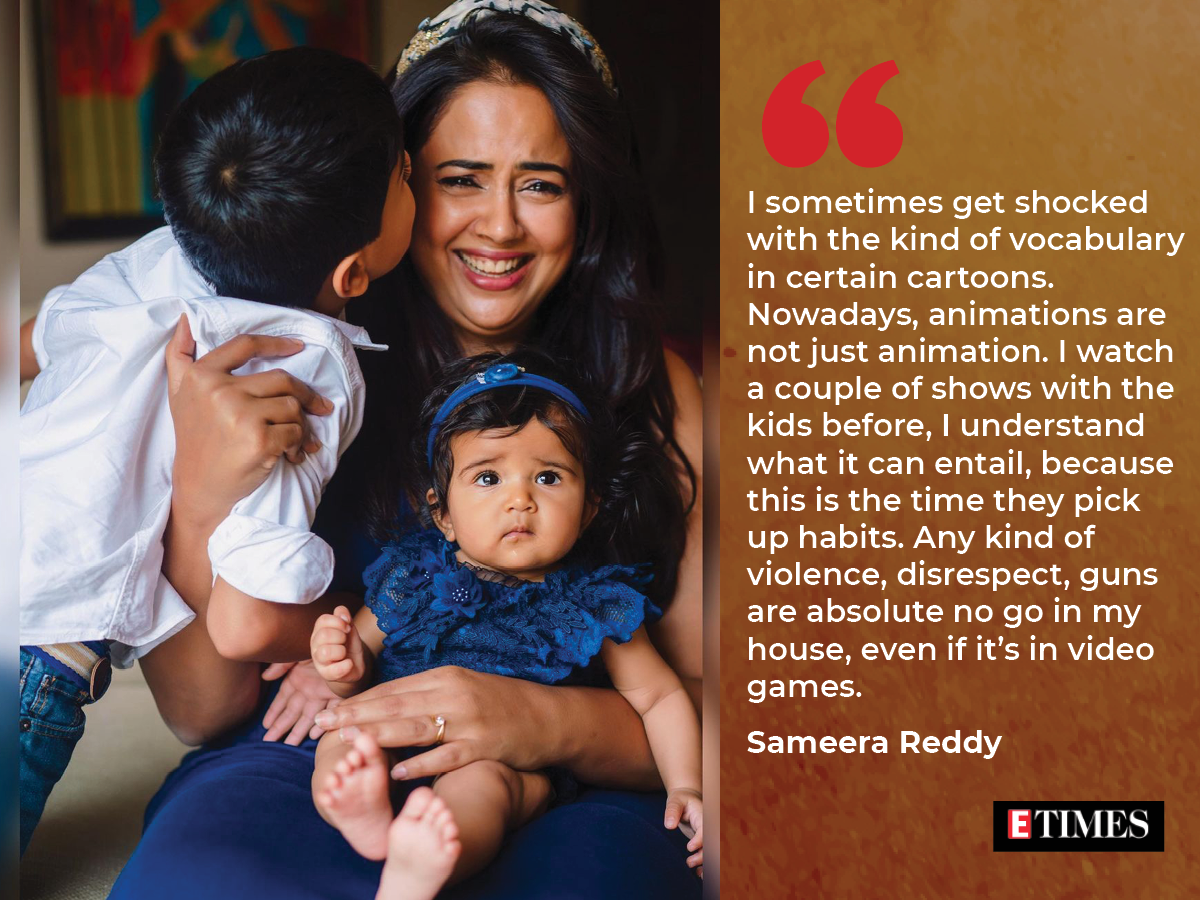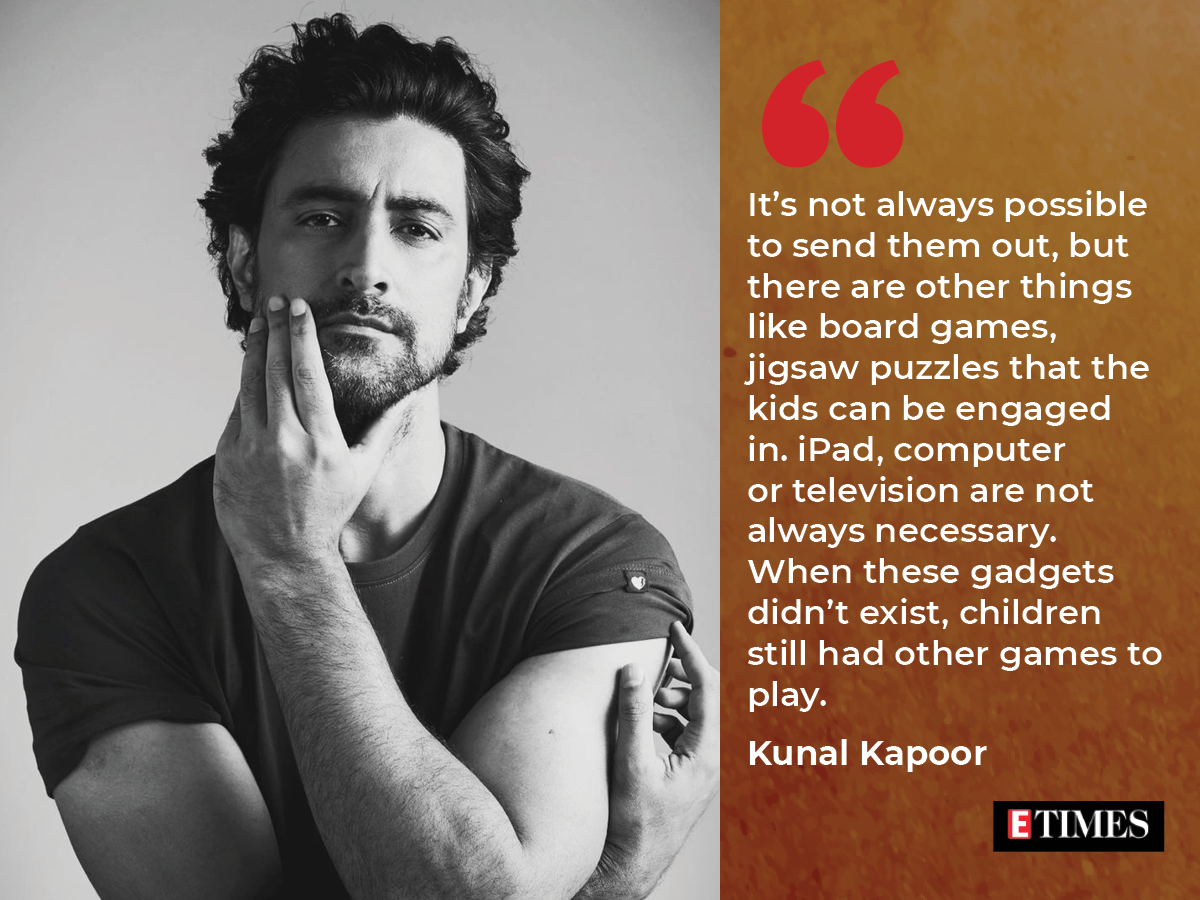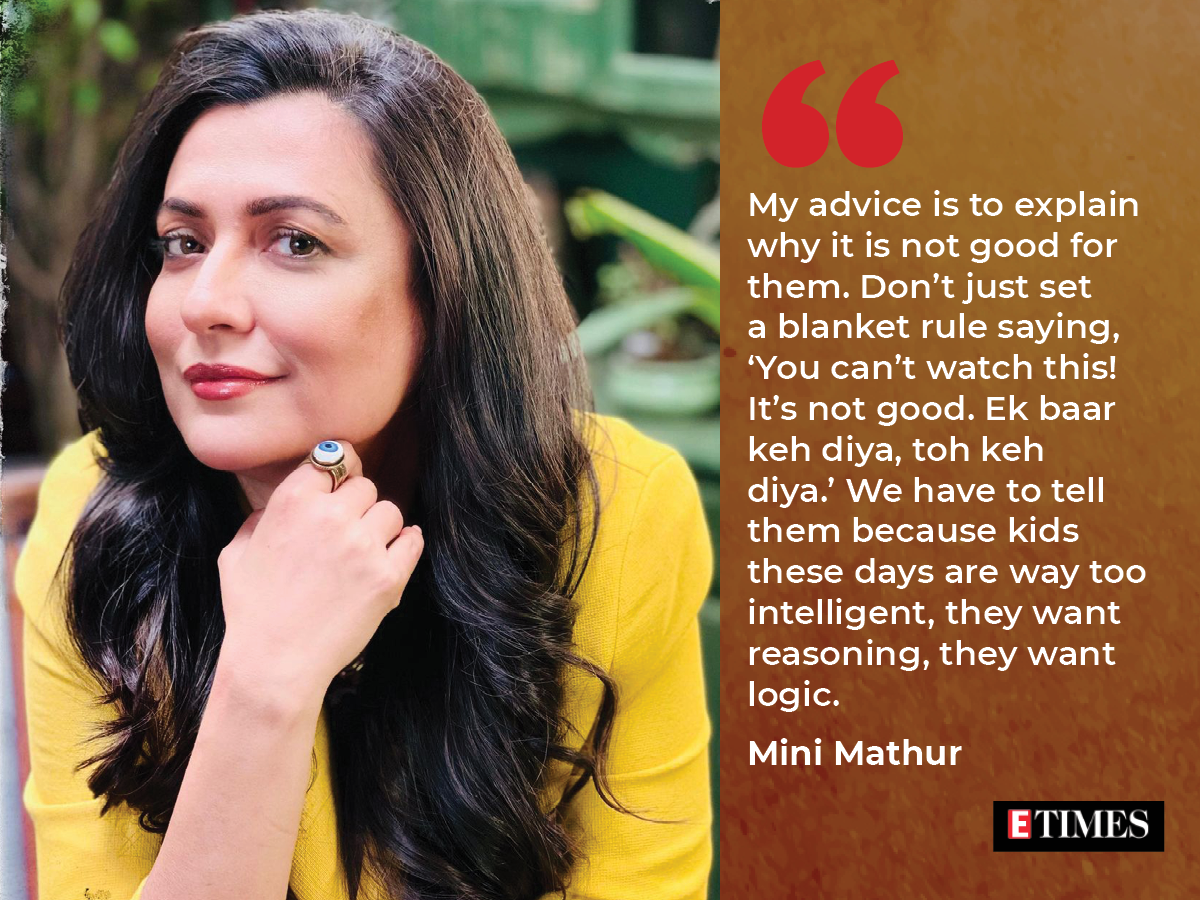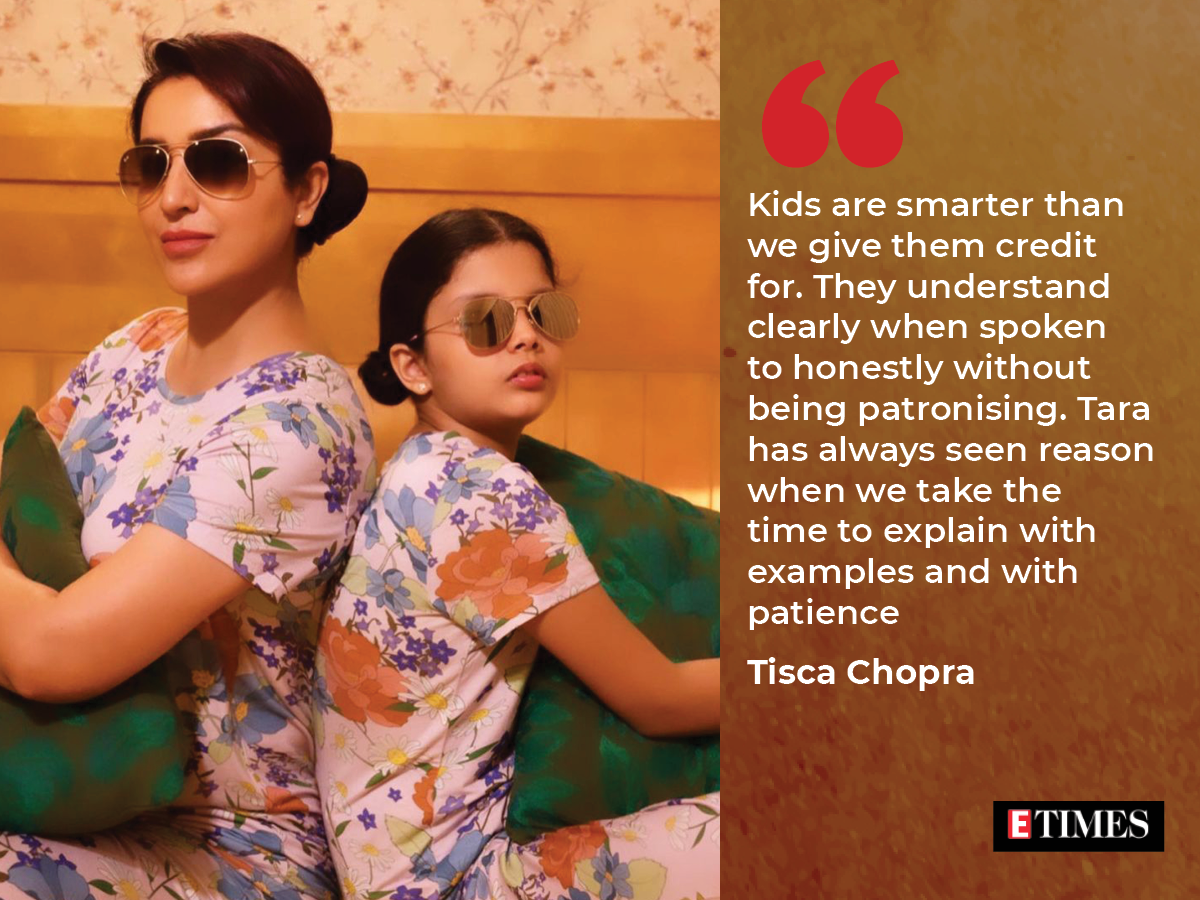
Recently, veteran actress Sharmila Tagore, all set to make a comeback with family drama ‘Gulmohar’, mentioned her grandkids Taimur Ali Khan and Jehangir Ali Khan are not allowed to watch movies yet. Not long ago, Ayushmann Khurrana revealed his kids are not allowed to watch his films. “I am conscious in a way. Every film has a kissing scene, so it’s not right for them to see their father kissing some other woman,” he said.
Which brings us to wonder how exercising control over what the kids watch, how much time they spend on the screens has become an integral part of new age parenting. As psychiatrist Dr Harish Shetty says, “Children need to be regulated as far as TV time is concerned. OTT platforms and content on many channels are detrimental to the health and emotional development of the child. Uncontrolled watching can lead to deviant behaviours and affect the personality of the child. Violence and explicit sexual content when viewed at a very young age can colour thinking, feeling and behaviour.”
But is banning screens an answer? Can kids be engaged with healthy content that facilitates adaptive learning instead? How much do celebrity parents control what their kids watch? What are the real concerns and being in showbiz, do they alter their professional choices considering their kids? We find the answers in this week’s #BigStory.
Parental guidance to the rescue
In the age of the internet and smartphones, it is no rocket science for kids to crack the code and get their hands on content you may find problematic. The good news is tech companies are catching on and are rolling out newer options to give parents better control over what their kids have access to watch. Actress and mother of two kids Sameera Reddy is extremely particular about what her kids (aged 7 and 3) watch. “So many platforms have parental controls. I still don’t allow my kids access to TV or iPad on their own. It’s always monitored. You never know what comes in the form of advertisements. As a mother I am extremely particular about stuff like this. They also have a controlled screen time in general when they watch on an OTT platform which is by choice, without giving them access to choose what they want.”
Mini Mathur, mother to two teenagers (19 and 13) too relies on parental guidance settings. “The one who is 19 is now supervising himself. Thankfully, a lot of platforms have parental guidance settings. So we always do that and she (13-year-old daughter) sort of asks for permission if she is watching something she is not supposed to watch. Also we have profiles and all profiles are locked; her profile is a kids profile. It’s easy to see the algorithm of what she watches. Once in a while I log in to see what she is watching and most of the time we watch a lot of things together as well. They are mostly sitcoms like ‘Schitt’s Creek’, ‘Friends’… The teen drama that she watches, once in a while, I watch and say it’s not appropriate and change things around.”
Children these days are so exposed to anything and everything on the internet that there’s really no telling. “When they were younger, we had Net Nanny on their computer which disallowed content that was not age appropriate. With OTT, it is difficult for a child to go through a series without us not knowing,” Mini adds.
How much to censor
While content on the internet can be problematic for children’s viewing, cutting them off completely is no good solution. Mini Mathur agrees as she says, “We don’t believe in completely cutting off children from reality because then they will grow up in la la land. While anything that is explicit in nature or too violent or too abusive, we shut it off every time there is something that we think is not age appropriate. But there is also no escaping it.”
Being a family in the film industry and constantly in the media, there’s a lot of discussion around cinema and global content in Mini’s house, kids included. “The conversation on the dining table is about a lot of films and world cinema, so their appetite is also not to quickly sneak and watch some show that is not age-appropriate. My kids have never behaved like that, so I don’t know how other people are dealing with kids who surreptitiously watch stuff they are not supposed to. We don’t believe in hiding things from the kids but keeping it till it is appropriate for them to watch,” Mini shares.
The real concerns
Apart from films, television and OTT, there is also the ever increasing number of social media platforms that are a growing concern for parents. A health study indicates that children spending more than three hours a day on social media are twice as likely to suffer from poor mental health. Mini Mathur’s concern with exposure is to do as much with platforms like Instagram and YouTube as it is with film, TV and OTT content. “It is concerning how one algorithm follows the other and once you’ve watched a child doing hairstyle or makeup, all kinds of weirdos pop-up and tell you what are their notions of beauty and that affects their self esteem; and how on Instagram, everyone’s showing their best life and that can really influence children to believe that their life is not good enough. So my key observations are that there is no regulation. Anyone is an expert on anything without any qualifications. Suddenly you have these teen influencers who are telling you to do weird shit without any supervision of any kind. Not that I believe that it should be censored but I think there should be some sort of… the role, as parents, increases as to how much screen time you are allowing them, what are they watching, who are the people they are following, what is appearing on their explore page,” she says.

Sameera Reddy raises concerns with the vocabulary used in some of the cartoons for kids. “I sometimes get shocked with the kind of vocabulary in certain cartoons. Nowadays, animations are not just animation. I watch a couple of shows with the kids before, I understand what it can entail, because this is the time they pick up habits. Any kind of violence disrespect, guns… these are absolute no go in my house. Even if it’s video games, there are no aggressive video games,” she says.
Limiting the screen time
Actor Kunal Kapoor turned father earlier this year. As a new dad in town, he is taking cues from his friends and making parenting notes. “I have friends who allow their children the ipad and phone only for a certain amount of time in a day. I think that’s important because we live in a world where technology is unavoidable. When a child goes to school, they are going to be exposed to technology, and to other kids that are using technology. At the same time it’s also important that kids are not spending the whole day glued to a screen. It’s also important that they go out and do outdoor sports. There are different ways of engaging them. I think what’s important is a balance,” he says.
Screen time can be constructive too
Gadget screens can also be utilised for purposes other than viewing. Sameera Reddy is an extremely hands-on mom and engages her kids in several activities on her iPad. “We do a lot of reading, we do puzzles. I’ve taught my son how to edit and shoot. He can make his own documentary, he loves photography. I basically use an iPad not just for mindless watching, I also use it as a creative tool that has an audiobook, drawing, colouring… And then we even have a printer at home, so they actually learn to create things and put it up on the wall. One looks at screen time only as if it’s bad, but what are you using it for? Are you using it creatively? We can’t run away from the digital space, that is the future. But how can we make it a learning experience rather than just watching without any thought?” she says.
Kunal Kapoor agrees there’s both a good and a bad side to it. “There’s some content that you don’t want your children to watch. We also live in a world where anything that you need to learn can be done online. Even if I want to learn something, say if I want to learn a guitar, or learn how to code, I can get onto my iPad or computer or television and I’ll have so many resources to learn. Even 15 years ago, if you had to learn something, you had to go to a university, take up a course. So there’s also advantages to it and I think as a parent, it is also your responsibility as to what you are exposing your child to, especially when they are very young. So there is both good and bad; there is content that you don’t want the kids to watch and there is also educational content,” he says.
Television actor Ajay Singh Chaudhary, who is a father to a 7-year-old girl, too looks at the positive side of technology and says, “We are very alert about what our daughter is watching and what she is seeing on screen. We have movie time in our house when we watch age appropriate films of her choice together. In our childhood, we didn’t have so much exposure. But the kind of exposure OTT, YouTube and other platforms are giving is also good in a way, because the kids learn a lot from it. One has to definitely pay attention and observe what they are watching. I look at it in a positive way that she is learning a lot and is aware about a lot of things. Not allowing them access is not the solution,” he asserts.
Offline activities
Another effective way to reduce the children’s exposure to the world of web is by engaging them in offline activities that are both fun and healthy. “I have often seen that there are parents who want to do something of their own, so they hand over the iPad to the kids to keep them busy. But I think there are other ways. It’s not always possible to send them out, but there are other things like board games, jigsaw puzzles that the kids can be engaged in. iPad, computer or television are not always necessary. When these gadgets didn’t exist, children still had other games to play,” says Kunal Kapoor.

Honest conversations go a long way
It’s getting increasingly important for new age parents to spend more time supervising and gently guiding the kids out of what they think isn’t healthy. Mini Mathur is thankful they still have live conversations in her house. “We have dining table time or together time where phones are not allowed, so the kids are not always into YouTube and Instagram. How you explain the nature of the game to them is important at this point. How you explain the negative side of this exposure… you can’t force them to do anything, let’s be very clear. But if you give them the right perspective and have healthy conversation which is not preachy and parent-to-child, but more friendly, then they view everything in perspective,” she shares.
“I talk to my child a lot,” says Sameera. “Instead of just snapping, ‘Yeh mat dekho!’ I actually explain to him why I am saying it. One day, he asked me about his friends playing these shooting games. I explained to him why I don’t think it is okay at this age. I explained to him what guns entail and what it can actually do. When explained and communicated well, the children also understand why the parent is saying no,” she adds.

The more you prohibit or stop your kids from watching something openly, the more they want to watch it, believes Mini. “If you don’t put down very hard and fast, deep, dark lines for your children, they will not want to skip it when you’re not looking. We have always had a very open atmosphere with our kids at home. We treat them with a hand that kind of watches what they are doing, but we have very open conversations. And I allow my children to judge me by my mistakes as well. So it’s not that I am trying to put a perfectionist image, that is a very tough act to follow. So when they see their parents also have scope for mistakes and they learn from them as well, it is a good atmosphere. So my advice is to explain why it is not good for them. Don’t just set a blanket rule saying, ‘You can’t watch this! It’s not good. I have said so! Ek baar keh diya, toh keh diya.’ That is wrong. We have to tell them because kids these days are way too intelligent, they want reasoning, they want logic. Once they understand it, I don’t think they are in too much of a hurry to watch what they are not supposed to,” she says.
Actress Tisca Chopra, mother to 9-year-old Tara, too believes having an open and free discussion is the best way. “Kids are smarter than we give them credit for. They understand clearly when spoken to honestly without being patronising. Tara has always seen reason when we take the time to explain with examples and with patience,” she says.

Do kids influence the professional decisions stars make?
In the words of Franklin D Roosevelt, ‘We may not be able to prepare the future for our children, but we can at least prepare our children for the future.’ And the best way to teach is by setting an example. So does parenting ever influence the professional choices that stars make, in order to set examples for their kids?
“As a choice in what I do and the content I make, I am very particular of what it entails, what the kids are saying,” says Sameera Reddy who has a strong presence on social media and is a huge influencer mommy. “Because today in the name of making fun and reels, kids are over exposing themselves to a lot of things. It is scary. I am very particular about the songs they are listening to, about the words they are listening to. I remember growing up on the song ‘I am a Barbie girl in the Barbie world’. But today it’s not the kind of song I would allow my child to listen to. It’s cute but if you hear the words, you’ll think what are they saying. And sometimes in the name of a hit song, the words are just so inappropriate. They have to come to an age where they understand the difference,” she asserts.
Mini Mathur too says she has not made any choices that her kids will be uncomfortable with. “I definitely keep in mind that I do have two teenage children. More than them judging me for what I am doing, I don’t judge… Just because you have kids, you can’t dress a certain way, or be a certain way… I am no ageist that way at all. But yes, if I do portray some sort of a wicked witch or a mass murderer in a project, I will make sure my children understand that it is not the real me. They are old enough. When they were younger, I was more careful of doing more relatable stuff. I don’t think that inhibits me as far as acting is concerned. I am more particular about the examples I set for them in terms of the choices I make, why I make them, how I reason out my choices while choosing a project, what the project will bring in me, what I am having to put out there… I think open conversation in front of the children is the only way,” she says.
Tisca Chopra resonates, “My work choices have always been dictated by what I connect with at a script level and not because my child can or cannot see it. She will at some point see all my work anyway, so I prefer she see it when it’s appropriate for her to see it, rather than make choices that she can relate to now. She has a good idea that work is work and what I do is acting.”